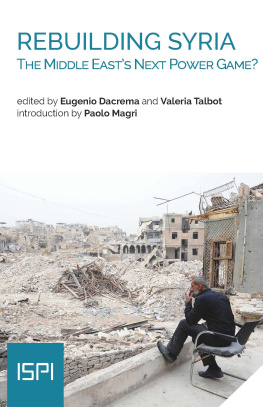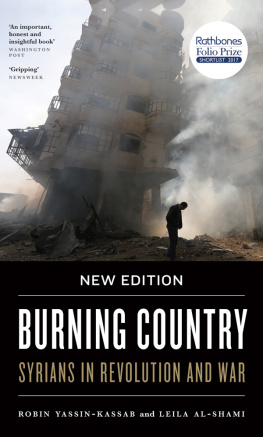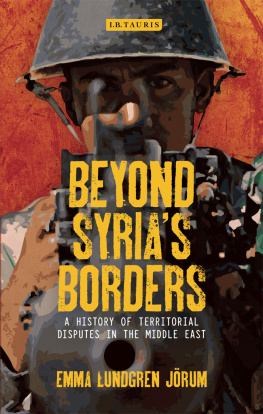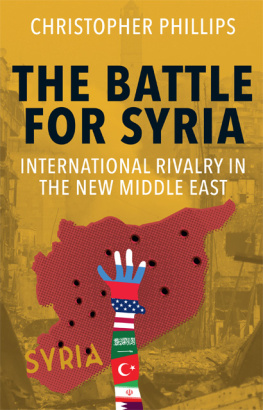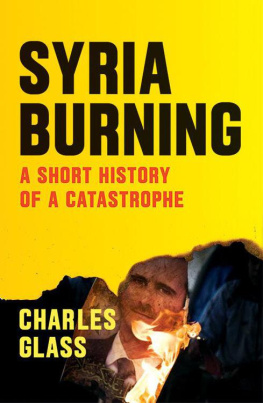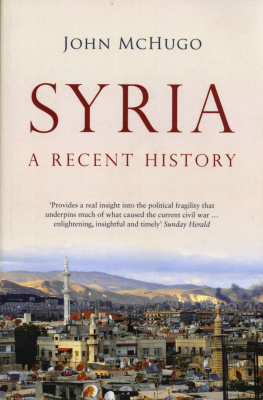2019 Ledizioni LediPublishing
Via Alamanni, 11 20141 Milano Italy
www.ledizioni.it
Rebuilding Syria: The Middle Easts Next Power Game?
Edited by Eugenio Dacrema and Valeria Talbot
First edition: September 2019
The opinions expressed herein are strictly personal and do not necessarily reflect the position of ISPI.
Print ISBN 9788855260589
ePub ISBN 9788855260596
Pdf ISBN 9788855260602
DOI 10.14672/55260589
ISPI. Via Clerici, 5
20121, Milan
www.ispionline.it
Catalogue and reprints information: www.ledizioni.it
Introduction
Over the last eight years the Syrian conflict has developed into one of the worst humanitarian tragedies of modern times. More than half a million victims, 5 million refugees abroad and 6 million internally displaced: the figures only capture part of Syrias catastrophe. In addition, there is all the less quantifiable damage to the countrys social fabric. For almost a decade entire generations have been partly or wholly deprived of good-quality education, and many of the countrys more educated young people have moved away; those who remain have gone through the horrors of exacerbated polarisation and sectarianism, growing poverty and ruthless violence, while most Syrian refugees abroad have had to endure dramatic living conditions for many years, along with growing intolerance from the host communities.
Against this backdrop, the aim of this Report is not to describe how the old Syria could be restored. Instead, it examines the countrys evolution since 2011 and explores the paths it might take in future when the conflict ends. The Report tries to answer a few crucial questions: How can a country whose society has gone through such trauma and destruction reimagine itself and its future? What conditions would allow the return of those Syrians who were forced to leave their homes? What are the regional and international dynamics that will shape Syrias future? What are the roles and interests of external players?
As Eugenio Dacrema explains in the Reports first chapter, recognising the damage to Syrias social fabric caused by this conflict raises one essential question from the start: what does reconstruction mean in the Syrian context? The very word reconstruction makes us think about a process meant to bring a situation back to a previous, more desirable state. In the case of Syria, we are invited to consider a process aimed at bringing the country back to its pre-war situation. In fact, most of the cost estimates by international institutions such as the World Bank and the UN are predicated on this idea: how much would it cost to rebuild Syria as it was in 2010? However, such an approach can be misleading, especially for a country that has been going through a ferocious eight-year civil war, for civil wars of such ferocity and length have throughout history had profound effects on society. They trigger huge transformations that deeply affect the post-war situation; and the Syrian conflict is no exception. The very fact that the Syrian regime has managed to remain in power almost intact should be carefully pondered. Although the political structure of the Syrian state has not changed, everything else has. Dacrema describes the deep changes which have occurred throughout the region with the emergence of a new political rift between those governments (Turkey and Qatar) which supported the popular uprisings of the Arab Spring (especially their Islamist components), and others (Saudi Arabia and the UAE) that have been struggling to defend the status quo . This new political divide cuts across the older one between Iran and Saudi Arabia, creating new alliances and tensions across the Middle East. Furthermore, the partial eclipse of US influence in the region has opened a vacuum that has been occupied by new international actors such as Russia.
These changes at regional and international level have had profound effects on the course of the Syrian conflict: by prolonging and exacerbating it, they have been key factors in determining the level of human and physical destruction. Joseph Dahers chapter provides a detailed description of the damage caused by conflict. It narrates the measures taken to date by the regime and its allies and explains the plans and estimates prepared by national and international organisations for Syrias reconstruction. Daher also describes the changes in the Syrian domestic economy during the conflict, as new powerbrokers were thrown up by the war economy and powerful new businessmen and warlords came to the fore alongside the dominant tycoons of the pre-war period such as Assads cousin Rami Makhlouf.
In this context, a crucial question should be raised: who is going to foot the bill for the countrys reconstruction? The World Bank has estimated the damage at $200bn, while the UN Economic and Social Commission for West Asia (ESCWA) forecasts that the total cost of restoring the country to its 2010 condition will be almost $400bn. These are huge figures, and it is hard to imagine such resources being found quickly or easily; but developments on the ground are already raising urgent questions about how Syria is to be rebuilt, and who will pay.
To tackle such questions Julien Barnes-Dacey explores the power politics that have developed around Syrian reconstruction. For instance, while the Assad regime has shown considerable resilience and seems likely to remain in power for the foreseeable future it lacks the means to rebuild the country on its own. Its main allies, Russia and Iran, are not endowed with the kind of financial resources needed for a significant contribution; and indeed, they have already started jockeying for position to profit as much as possible from reconstruction contracts and from exploiting the countrys limited natural resources. As for the West, the EU and US have imposed sanctions designed to hobble Assads war machine and obstruct any attempts at reconstruction without a political resolution involving some sort of power-sharing, together with guarantees for the opposition and the refugees abroad. Until now, sanctions have proved effective in blocking attempts to involve European money or European companies in the reconstruction plans. They have also slowed the attempted rapprochement between the Syrian regime and the UAE/Saudi Arabian axis (which since the end of 2018 has significantly altered its approach towards Syria) and dissuaded those countries from offering more towards reconstruction. With Western powers and wealthy Arab states out of the picture at least for the moment Damascus has been looking elsewhere for support, for example to friendly emerging powers such as China. Despite Assads efforts to court Beijing, though, the Chinese authorities have so far given only cautious and general undertakings.
Besides, neighbouring countries such as Jordan and Lebanon have already begun to position themselves to benefit from the process. Bachar El-Halabis chapter describes attempts by Jordan and Lebanon to attract foreign investment and act as hubs for future economic operations in Syria. Amman and Beirut have been strengthening relations with the Assad regime and planning infrastructure to improve connections from their ports and industrial areas to Syrian territory. So far, however, such efforts have given very poor results: the continuing uncertainty over Syrias reconstruction has discouraged foreign interest and investment in Jordanian and Lebanese infrastructure, not to mention the repatriation of Syrian refugees present in the two countries.

